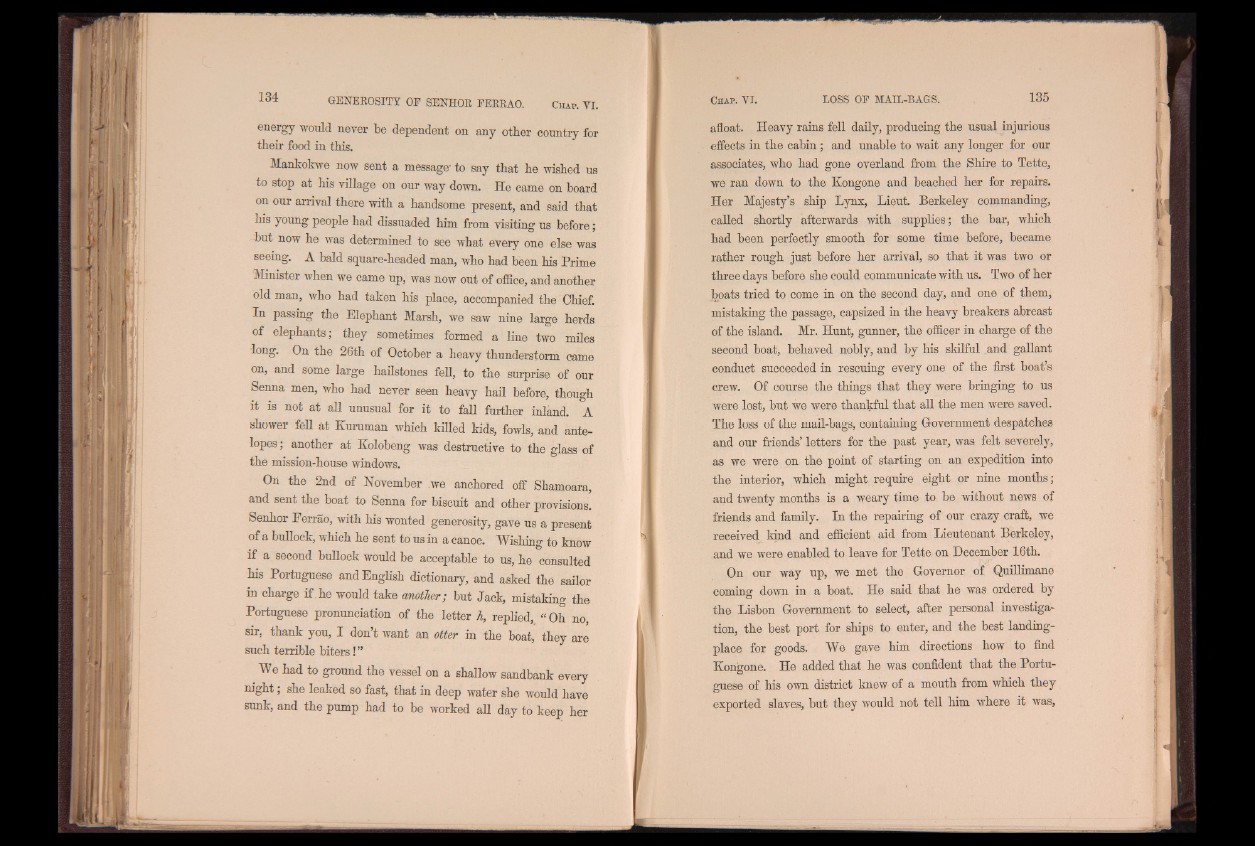
energy would never be dependent on any otber country for
their food in this.
Mankokwe now sent a message1 to say that he wished us
to stop at his village on our way down. He came on board
on our arrival there with a handsome present, and said that
his young people had dissuaded him from visiting us before;
hut now he was determined to see what every one else was
seeing. A bald square-headed man, who had been his Prime
Minister when we came up, was now out of office, and another
old man, who had taken his place, accompanied the Chief.
In passing the Elephant Marsh, we saw nine large herds
of elephants; they sometimes formed a line two miles
long. On the 26th of October a heavy thunderstorm came
on, and some large hailstones fell, to the surprise of our
Senna men, who had never seen heavy hail before, though
it is not at all unusual for it to fall further inland. A
shower fell at Kuruman which killed kids, fowls, and antelopes
; another at Kolobeng was destructive to the glass of
the mission-house windows.
On the 2nd of November .we anchored off Shamoara,
and sent the boat to Senna for biscuit and other provisions.
Senhor Eerrao, with his wonted generosity, gave us a present
of a bullock, which he sent to us in a canoe. Wishing to know
if a second bullock would be acceptable to us, he consulted
his Portuguese and English dictionary, and asked the sailor
in charge if he would take another; but Jack, m is ta k in g the
Portuguese pronunciation of the letter h, replied, “ Oh no,
sir, thank you, I don’t want an otter in the boat, they are
such terrible biters!”
_We tad to gromd the vessel on a shallow sandbank every
night; she leaked so fast, that in deep water she would have
sunk, and the pump had to be worked all day to keep her
afloat. Heavy rains fell daily, producing the usual injurious
effects in the cabin; and unable to wait any longer for our
associates, who had gone overland from the Shire to Tette,
we ran down to the Kongone and beached her for repairs.
Her Majesty’s ship Lynx, Lieut. Berkeley commanding,
called shortly afterwards with supplies; the bar, which
had been perfectly smooth for some time before, became
rather rough just before her arrival, so that it was two or
three days before she could communicate with us. Two of her
boats tried to come in on the second day, and one of them,
mistaking the passage, capsized in the heavy breakers abreast
of the island. Mr. Hunt, gunner, the officer in charge of the
second boat, behaved nobly, and by his skilful and gallant
conduct succeeded in rescuing every one of the first boat’s
crew. Of course the things that they were bringing to us
were lost, but we were thankful that all the men were saved.
The loss of the mail-bags, containing Government despatches
and our friends’ letters for the past year, was felt severely,
as we were on the point of starting on an expedition into
the interior, which might require eight or nine months;
and twenty months is a weary time to be without news of
friends and family. In the repairing of our crazy craft, we
received kind and efficient aid from Lieutenant Berkeley,
and we were enabled to leave for Tette on December 16th.
On our way up, we met the Governor of Quillimane
coming down in a boat. He said that he was ordered by
the Lisbon Government to select, after personal investigation,
the best port for ships to enter, and the best landing-
place for goods. We gave him directions how to find
Kongone. He added that he was confident that the Portuguese
of his own district knew of a mouth from which they
exported slaves, but they would not tell him where it was,